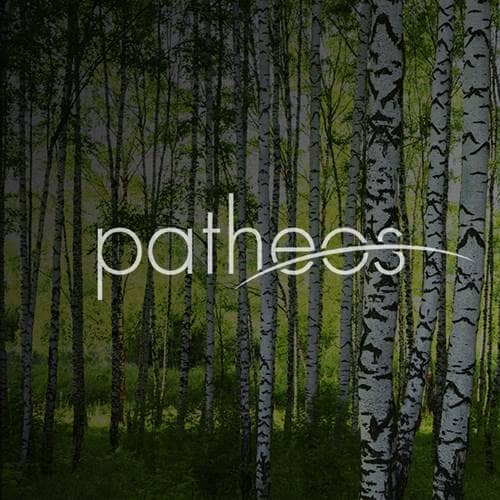- Trending:
- Pope Leo Xiv
- |
- Israel
- |
- Trump
- |
- Social Justice
- |
- Peace
- |
- Love
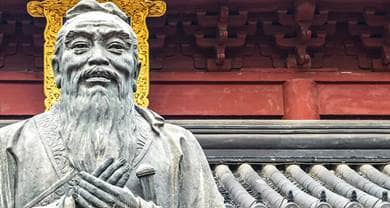
RELIGION LIBRARY
Confucianism
Afterlife and Salvation
Kongzi stated that the afterlife was beyond human comprehension. Humans should live and behave in such a way as to promote ideal social relations, rather than to act based on the expectations of rewards or punishments after death. In Confucian terms, a meaningful life is one in which one develops one's innate moral potential to the fullest while fulfilling all of one's social obligations. At the same time, from a Confucian perspective, one cannot live fully in the present without being fully responsible to the past, both in terms of paying respect to one's ancestors and making the best of what they have left behind.
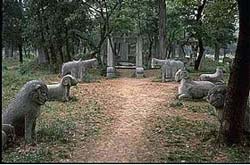 Although Confucians do not typically hold beliefs about the individual salvation or damnation of persons beyond this life, ancestor worship is an important part of Confucian faith and practice. Ancestor worship is among the oldest and most enduring Chinese religious practices. Even though the cult of ancestors frequently has been described as Confucian, devotees of nearly every religious tradition in China practice ancestor worship. Confucian texts universally refer to ancestor worship approvingly and commend it as a means of cultivating the virtue of filial piety (xiao) as well as instilling harmonious relations in society. It is not always clear whether classical Confucian authors maintained belief in the supernatural existence or power of ancestors, but their reverence for ancestor worship as a core element in the spiritual life is unambiguous. What happens to human beings after they die is less important to Confucian thinkers than how the living fulfill their obligations to the dead.
Although Confucians do not typically hold beliefs about the individual salvation or damnation of persons beyond this life, ancestor worship is an important part of Confucian faith and practice. Ancestor worship is among the oldest and most enduring Chinese religious practices. Even though the cult of ancestors frequently has been described as Confucian, devotees of nearly every religious tradition in China practice ancestor worship. Confucian texts universally refer to ancestor worship approvingly and commend it as a means of cultivating the virtue of filial piety (xiao) as well as instilling harmonious relations in society. It is not always clear whether classical Confucian authors maintained belief in the supernatural existence or power of ancestors, but their reverence for ancestor worship as a core element in the spiritual life is unambiguous. What happens to human beings after they die is less important to Confucian thinkers than how the living fulfill their obligations to the dead.
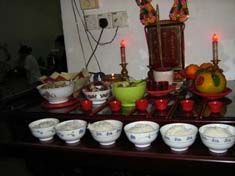 From Kongzi's lifetime until the Song dynasty (960-1279 C.E.), however, only members of the Chinese elite practiced formal ancestor worship. It was not until the "Neo-Confucian" revival that elite practices such as detailed genealogical record-keeping and the construction of temples dedicated solely to ancestor worship became part of everyday life for commoners. Song emperors, who relied upon Confucian scholars to help stabilize and legitimize their regime, listened when Confucian thinkers such as Cheng Yi (1033-1107 C.E.) advocated genealogical research and ancestral temples for non-elites. Later Confucian reformers, such as Zhu Xi, devised ritual manuals that helped formalize and popularize ancestor worship among the lower classes.
From Kongzi's lifetime until the Song dynasty (960-1279 C.E.), however, only members of the Chinese elite practiced formal ancestor worship. It was not until the "Neo-Confucian" revival that elite practices such as detailed genealogical record-keeping and the construction of temples dedicated solely to ancestor worship became part of everyday life for commoners. Song emperors, who relied upon Confucian scholars to help stabilize and legitimize their regime, listened when Confucian thinkers such as Cheng Yi (1033-1107 C.E.) advocated genealogical research and ancestral temples for non-elites. Later Confucian reformers, such as Zhu Xi, devised ritual manuals that helped formalize and popularize ancestor worship among the lower classes.
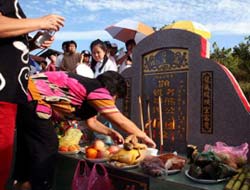 By the end of the Song dynasty, ancestor worship according to canonical Confucian procedures could be found at nearly all levels of Chinese society. As the Song regime lost prestige and territory to non-Chinese powers -- such as the Jurchen peoples who overthrew Song rule in northern China in 1127, or the Mongols, who defeated the final Song emperor's forces in 1279 and ruled China as the Yuan dynasty until 1368 -- ancestor worship became one way in which to bolster Chinese ethnic and national self-confidence. Indeed, as Christian missionaries encountered Confucian ancestor worship during the Ming and Qing dynasties, the cult of ancestors became a battleground between evangelists who hoped to win Chinese converts (by presenting ancestor ritual as an expression of social virtues rather than as an act of worship) and their critics (who viewed ancestors as pagan idols to be abandoned in favor of Christianity's one true god). Pope Clement XI's eventual condemnation of Chinese Christians' participation in ancestor worship in 1715 may be regarded as a Christian adjudication of a theological problem that never occurred to Confucians, who were more concerned with the personal and social effects of participation in ancestor worship than the reality of the beings at the center of the rites.
By the end of the Song dynasty, ancestor worship according to canonical Confucian procedures could be found at nearly all levels of Chinese society. As the Song regime lost prestige and territory to non-Chinese powers -- such as the Jurchen peoples who overthrew Song rule in northern China in 1127, or the Mongols, who defeated the final Song emperor's forces in 1279 and ruled China as the Yuan dynasty until 1368 -- ancestor worship became one way in which to bolster Chinese ethnic and national self-confidence. Indeed, as Christian missionaries encountered Confucian ancestor worship during the Ming and Qing dynasties, the cult of ancestors became a battleground between evangelists who hoped to win Chinese converts (by presenting ancestor ritual as an expression of social virtues rather than as an act of worship) and their critics (who viewed ancestors as pagan idols to be abandoned in favor of Christianity's one true god). Pope Clement XI's eventual condemnation of Chinese Christians' participation in ancestor worship in 1715 may be regarded as a Christian adjudication of a theological problem that never occurred to Confucians, who were more concerned with the personal and social effects of participation in ancestor worship than the reality of the beings at the center of the rites.
Today, those influenced by Confucianism rely on genealogical records kept by senior members to remember their dead at home altars, in family temples, or in public places of worship. Through the influence of Confucianism on China's neighboring cultures, Chinese norms for venerating deceased kin have spread across East Asia. While Confucian worship of ancestors continued unabated in South Korea and Japan for most of the 20th century, in Vietnam, North Korea, and especially mainland China, ancestor worship and other Confucian practices were the targets of Communist persecution. Since the 1980s, both public and private ancestor worship have become more prominent in mainland China, and these practices have remained strong in Hong Kong and Taiwan as well as in overseas Chinese communities. Despite forceful trends toward modernization and secularization throughout East Asia, ancestor worship remains a vital component of community life in China, its surrounding region, and throughout the worldwide Chinese diaspora.
In Centrality and Commonality: An Essay on Confucian Religiousness (SUNY Press 1989), the contemporary "New Confucian" thinker Tu Weiming describes the religious dimension of Confucianism: "Being religious, in the Confucian perspective... means being engaged in the process of learning to be fully human. We can define the Confucian way of being religious as ultimate self-transformation as a communal act and as a faithful dialogical response to the transcendent." This lifetime process of ultimate self-transformation requires both membership in community (starting with a human family) and individual engagement with the source of ultimate meaning, Tian. Although Mengzi's vision of Confucianism largely established the parameters of Confucian spirituality for all subsequent generations, it was the work of his interpreter Zhu Xi that articulated most influentially what it means to live religiously as a Confucian.
Zhu saw the universe as constantly involved in a dynamic creative process of interplay between li (cosmic principle, including principles of morality, social order, etc.) and qi (vital energy, but also the material world in its tangible forms). For Zhu, the human heart-mind is where li and qi meet, become one, and help order the universe: "The heart-mind unites nature (i.e., qi) and emotion (i.e., li)." From a Confucian perspective, one can play no more important role than to co-create moral order in the cosmos. The proper unity of human nature with moral sentiments leads, through the discipline of Confucian self-cultivation, to the desired goal of cheng (authenticity or sincerity) as manifested in he (harmony) and zhong (centeredness) revealed through an exemplary moral life. In such a life, a Confucian sees both salvation here and now (in the sense that one has attained the Confucian goal of actualizing one's innate, Tian-given and Tian-identified, potential) and eternal life hereafter (in the sense that one becomes an example and model for others who seek to walk the Confucian path of self-transformation).
Study Questions:
1. What do Confucians believe about the afterlife?
2. What is the role of ancestor worship in Confucian spirituality?
3. How compatible are Confucian and Christian ideas about the afterlife?
4. What does it mean to be "religious" in a Confucian sense?
5. What is the primary spiritual goal of Confucians?








